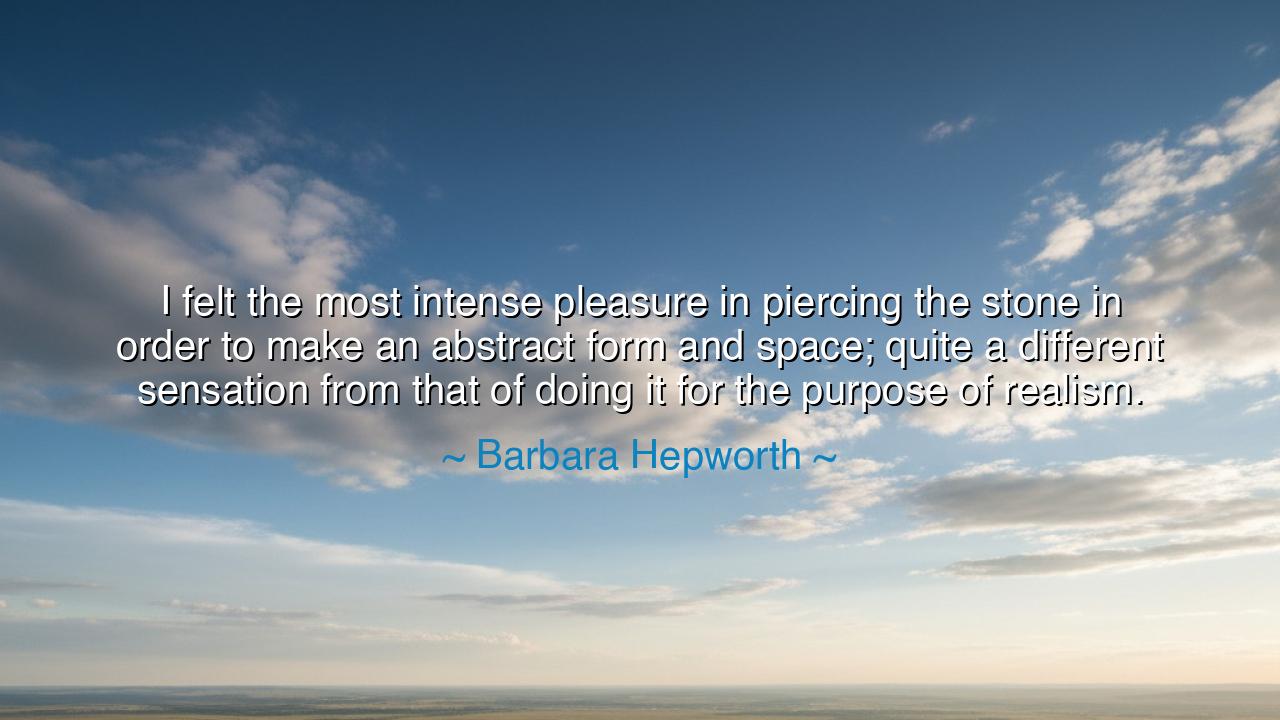
I felt the most intense pleasure in piercing the stone in order
I felt the most intense pleasure in piercing the stone in order to make an abstract form and space; quite a different sensation from that of doing it for the purpose of realism.






Barbara Hepworth, the great sculptor of the twentieth century, spoke with the voice of one who listened to stone itself: “I felt the most intense pleasure in piercing the stone in order to make an abstract form and space; quite a different sensation from that of doing it for the purpose of realism.” These words are not merely about carving; they are about vision, about the joy of shaping not what the eye sees, but what the soul imagines. For in abstract form, she discovered a freedom beyond imitation, a way to reveal the hidden language of matter itself.
To pierce stone is to converse with eternity. Stone is the flesh of mountains, the slow body of the earth itself. For centuries, sculptors sought to make it mimic life—to render faces, bodies, garments, as if stone were only a servant to realism. But Hepworth broke from this chain. Her pleasure was not in copying nature, but in transforming it, in opening voids where none existed, in shaping space itself as much as solid form. She knew that absence could speak as powerfully as presence, that the hole could carry meaning equal to the mass.
The ancients too glimpsed this truth. In the temples of Egypt, columns towered like forests, not imitating life but evoking eternity. In the caves of Ajanta, the sculptors did not only carve figures but shaped spaces that breathed with silence and resonance. Hepworth stood in this lineage, yet carried it further—seeking not the likeness of the human body but the essence of existence. Her abstract forms were not bound to flesh, but to the eternal dance between matter and void.
Consider Michelangelo, who believed that the figure already slept within the marble, waiting to be freed. His work was to strip away the excess until the hidden form emerged. Hepworth’s vision was different. She did not find her joy in liberating likeness, but in creating a new reality: piercing stone to open space that had never been. Where Michelangelo released what was already there, Hepworth invented what was not. This was her liberation, her pleasure—to step beyond representation into the realm of pure idea.
The meaning of her words, then, is profound: true creation is not in imitating the world, but in revealing new ways of seeing it. To copy is to honor the surface; to abstract is to honor the depths. In her pierced stones, we learn that emptiness can hold meaning, that the unseen can be as powerful as the seen, that the void carved into matter can itself become substance. She invites us to see that the space between forms is as sacred as the forms themselves.
The lesson is clear: do not be bound only to realism—whether in art, in thought, or in life. Reality is more than appearances; truth is more than imitation. Seek the deeper pleasure of shaping new possibilities, of creating not only what is, but what could be. Like Hepworth, dare to pierce the stone of habit, of convention, of expectation, and open spaces where imagination may dwell.
Practical action follows: in your work, do not strive only to mirror what already exists. Look for the spaces, the absences, the silences, and give them form. In relationships, honor not only words but the pauses between them. In creation, do not fear the abstract, for it often carries the truest reflection of the spirit. And in your life, remember that it is not only the visible achievements that matter, but also the invisible spaces you carve for rest, reflection, and love.
So let Hepworth’s words endure as a teaching: that the greatest pleasure lies not in copying the world but in transforming it, not in making stone look like flesh but in making stone reveal the infinite. For the abstract is not emptiness, but fullness in another key. And those who dare to pierce the stone, to create new spaces, become not imitators of reality, but co-creators with it—artists of existence itself.






AAdministratorAdministrator
Welcome, honored guests. Please leave a comment, we will respond soon